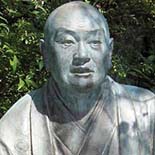 Ihara Saikaku, (1642 – September 9, 1693) was a Japanese poet and creator of the “floating world” genre of Japanese prose (ukiyo-zōshi).
Ihara Saikaku, (1642 – September 9, 1693) was a Japanese poet and creator of the “floating world” genre of Japanese prose (ukiyo-zōshi).
Born as Hiraya, the son of a wealthy merchant in Osaka, he first studied haikai poetry under Matsunaga Teitoku and later studied under Nishiyama Sōin of the Danrin school of poetry, which emphasized comic linked verse. Scholars have described numerous extraordinary feats of solo haikai composition at one sitting; most famously, over the course of a single day and night in 1677, Saikaku is reported to have composed at least 16,000 haikai stanzas, with some sources placing the number at over 23,500 stanzas.
Later in life he began writing racy accounts of the financial and amorous affairs of the merchant class and the demimonde. These stories catered to the whims of the newly prominent merchant class, whose tastes of entertainment leaned toward the arts and pleasure districts.
The death of his dearly beloved wife in 1675 had an extremely profound impact on him. A few days after her death, in an act of grief and true love, Saikaku started to compose a thousand-verse haikai poem over twelve hours. When this work was published it was called Haikai Single Day Thousand Verse (Haikai Dokugin Ichinichi). It was the first time that Saikaku had attempted to compose such a lengthy piece of literature. The overall experience and success that Saikaku received from composing such a mammoth exercise has been credited with sparking the writer’s interest in writing novels.
Shortly after his wife’s death, the grief-stricken Saikaku decided to become a lay monk and began to travel all across Japan, thus leaving behind his three children (one of whom was blind) to be cared for by his extended family and his business by his employees. He started his travels after the death of his blind daughter.
Sample prose:
Men take their misfortunes to heart, and keep them there. A gambler does not talk about his losses; the frequenter of brothels, who finds his favorite engaged by another, pretends to be just as well off without her; the professional street-brawler is quiet about the fights he has lost; and a merchant who speculates on goods will conceal the losses he may suffer. All act as one who steps on dog dung in the dark. —Ihara Saikaku, What the Seasons Brought to the Almanac-Maker (1686)
In view of our years of intimacy, I am deeply hurt that you should hesitate to die with me. Lest it prove to be a barrier to my salvation in the next life, I decided to include in this final testament all of the grudges against you that have accumulated in me since we first met. First: I made my way at night to your distant residence a total of 327 times over the past three years. Not once did I fail to encounter trouble of some kind. To avoid detection by patrols making their nightly rounds, I disguised myself as a servant and hid my face behind my sleeve, or hobbled along with a cane and lantern dressed like a priest. No one knows the lengths I went to in order to meet you! —Ihara Saikaku, Love Letter Sent in a Sea Bass (1687)